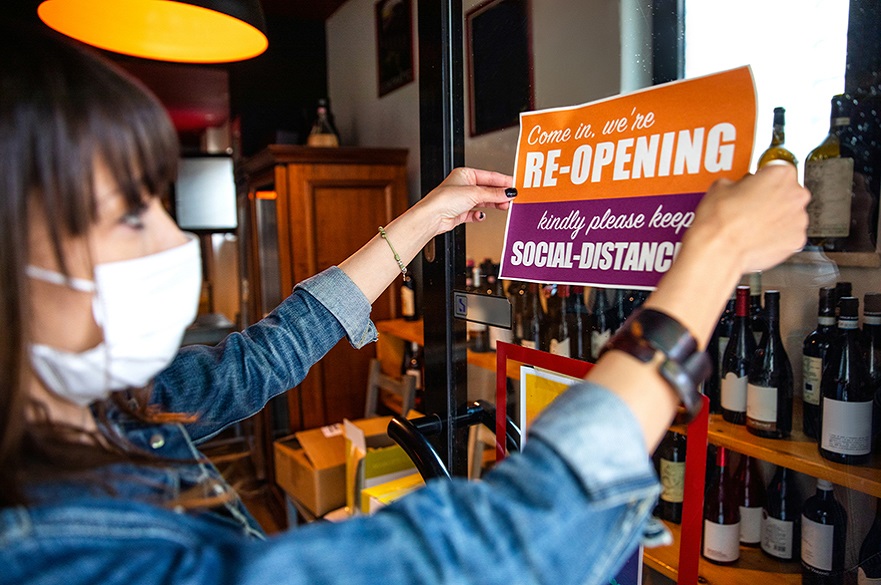Expert Blog: As hospitality returns, so do our emotions
As pubs and restaurants reopen across the UK, Nottingham Trent University PhD researcher, Guy Lincoln, discusses the impact of hospitality on our emotions and how we might feel about returning to our favourite venues.
By Helen Breese | Published on 6 July 2020
Categories: Press office; Research; Nottingham Business School;

For a number of weeks now the hospitality industry has been high on the agenda of mainstream media in the UK. We have been hearing plenty about the challenges facing the industry as a result of the Covid pandemic as well as many positive messages about the contribution the industry makes to people’s quality of life and to the economy.
It seems that it has required the hospitality experience to be almost completely removed from our reality before it is acceptable to reflect the positive aspect – ‘you don’t miss your water ‘til your well runs dry’ indeed. For those of us who work in or with the industry this affirmative coverage is welcome, even if we do remain ever so slightly suspicious of the motives or where it will ultimately lead.
Now, as the reopening of hospitality businesses begins, however tentatively, we are beginning to see the resurfacing of concerns associated with the industry. The focus of these apprehensions has shifted however. Moving from the industry’s apparent contribution to societal problems such as obesity and alcohol abuse on to its suggested role as the likely source of a second spike in Covid infections as well as the propensity for violence and unrest on the reopening of pubs and bars: I saw separate pieces about each of these issues on the BBC TV news on the morning of 29th June.
Once again, in an overtly emotional way, our attention is being drawn to the negative potentials of hospitality businesses, shaping our experiences and informing our perceptions. Thus highlighting the position of emotions at the centre of our engagement with hospitality. The industry’s discussions concerning the reopening of hospitality businesses, however, have focused on the practicalities; can the return be done safely within the guidelines and if it is can this be financially viable? These are clearly very important concerns and that they have taken up people’s time and energy is entirely appropriate BUT this single focus ignores the centrality of emotions to the provision of hospitality and the hospitality experience.
The delivery and consumption of hospitality is laden with emotions and these emotions are central to the connections that create hospitality experiences for customers, operators and owners alike. Witness for example the emotional performance of the service encounter, the feeling of belonging and the sense of connection that customers encounter, the interest and excitement that is stimulated by the theatricality of street food vendors, the passion chefs have for produce and the delight they take in creating. Also the pride, identity and status that owners and operators derive from their businesses and engagements with customers.
All of this is a whole messy jumble of emotional entanglements, meaning and resonances that connects customers, staff, owners, investors and suppliers and shapes our experience of hospitality. This entire affective system has been largely ignored by operators and researchers and unfortunately we understand little of its nature or complexity.
Why this matters now, in particular, is that there is a new set of emotions to take into account and we know even less about these in this context. We have primarily associated the experience of hospitality with pleasurable emotions (that is the point of it after all!) but we all now have to contend with hospitality as a hazardous and menacing environment that raises anxiety and stress, causes fear and leaves us feeling powerless, unsettled and perplexed.
Our limited comprehension of the (new) emotions at the core of the experience means that we are unable to make anything but the wildest guess about how people are going to respond emotionally to the ‘new hospitality’. We are unclear about how these emotions will shape what people take from engagements with hospitality businesses or how this will shift our perceptions and influence our behaviour. For example on leaving the restaurant will our reflection on the first experience be shaped by gratitude that we have not had to sit too close to a stranger? How we will engage with the business, with staff and with other customers remains a mystery of ‘man-v-food’ proportions? Similarly unclear are the feelings staff will have about customers and responses they will make, or how owners and operators will feel about their businesses when they are now how they were originally seen in their dreams.
This uncertainty is what underpins the ambiguity of reopening and whether it can be done safely and in a way that is financially viable. The emotional response of all involved will go some way to determining the answer to both these questions and our neglect of emotions as a core element of the hospitality experience has meant that we are less well prepared to re-engage as lockdown ends than we (sh)could have been.
An enhanced understanding of the emotional complexities at the heart of the hospitality experience would have put us in a better position to adapt to the reopening much more effectively. It may be too late to help us with what happens over the next few weeks but work being undertaken in the Nottingham Business School Marketing and Consumer Studies Research Group is currently addressing this issue for future reference.
Guy Lincoln is based in the NBS Marketing and Consumer Studies group where he is researching a PhD into the role of emotions in hospitality investment decision making. He has lived and worked in and around the hospitality industry for over 40 years; as an educator, operator, researcher, consultant, investor and, of course, consumer – though not necessarily in that order of priority. His passion for the industry continues undiminished but his consideration of its practices remains questioning.